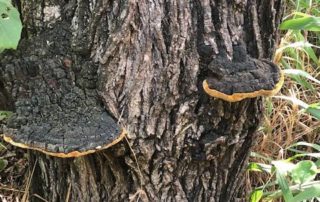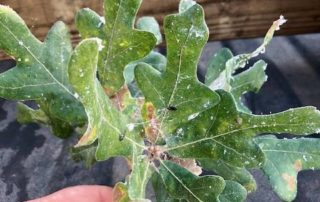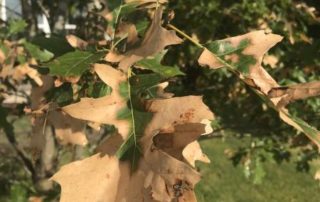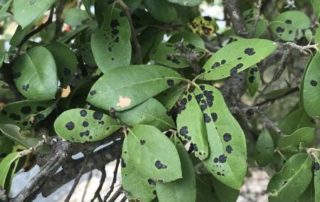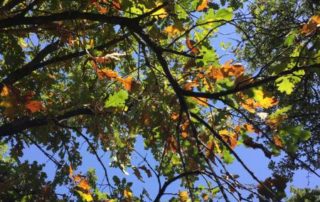Our Tree Care Services Round Rock, TX
Here at Good Guys Tree Services we take care of your trees here in Round Rock, Texas. With over 20 years’ experience as a professional arborist company, we know exactly what unique challenges trees face here in Round Rock, providing our customers with essential tree care services that ensure the longevity of their trees!
Services We Provide As Tree Doctors Who Care
- Chlorosis & Other Mineral Deficiencies
- Conks, Cankers, Brackets & Armillaria growths
- Fungal Infections
- Wound Care
- Bacterial Infections
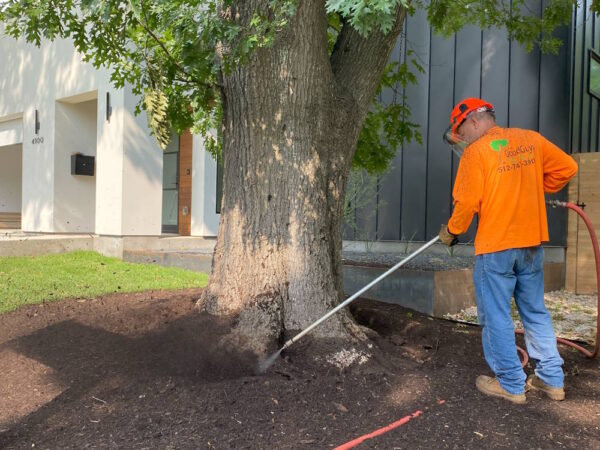
Chlorosis & Tree Mineral Deficiencies That Need Tree Care
Countless trees throughout Round Rock suffer from mineral deficiencies. This is because the unique climate here, which makes it harder for some trees to get the necessary nutrients and minerals for healthy growth.
Chlorosis is possibly the most common type of mineral deficiency in trees, with a lack of iron cause the tree to become anemic. Common signs of chlorosis include lighter toned leaves, often to the point of yellowing.
Other common mineral deficiencies affecting trees include lack of zinc and manganese, typically shown in leaves that are blotchy and underdeveloped.
How We Treat Chlorosis
Thankfully, this ailment is easy enough to treat using a specially formulated treatment that we inject directly into the tree. This absorbs very quickly, with signs of improvement showing in as little as four weeks’ time.
Good Guys Tree Service provides certified arborist consultations, full treatment programs and complete tree maintenance services. Contact us today to schedule an appointment!
Fungal & Bacterial Infections That Truly Need a Tree Doctor
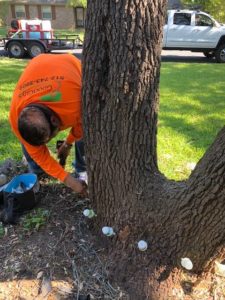 Just like people, trees are susceptible to infections due to bacteria and fungi. We have extensive experience identifying and treating all kinds of bacterial and fungal infections affecting trees in Round Rock, so be sure to contact us if you feel there is a problem!
Just like people, trees are susceptible to infections due to bacteria and fungi. We have extensive experience identifying and treating all kinds of bacterial and fungal infections affecting trees in Round Rock, so be sure to contact us if you feel there is a problem!
Signs of fungal infection on tree leaves include:
- Spots
- Streaks
- Mold
- Warping
- Twigs with dying tips
Signs of bacterial infection on leaves include:
- Blight
- Scorching
- Shriveling
- Burnt tips
How We Treat Bacterial and Fungal Infections
A systemic fungicide is applied to trees with fungal infections, killing it off and preventing spread to other parts of the tree or nearby trees.
Treatment for bacterial infection is more varied depending on the type of infection, with possible solutions including pruning branches, aerating soil, or applying insecticides. We may also include a treatment to help with recovery after addressing the environmental cause of the infection.
Tree Growths
Countless trees in Round Rock suffer from growths, and most of these are completely harmless, if a little unsightly. For instance, any common growth like a canker, conk, bracket, or armillaria found on branches are not a problem, requiring some minor pruning to eliminate.
However, certain growths on the trunk of the tree are a big problem. This is a more serious type of fungal infection that will kill off the tree eventually. Basically, the dead wood inside the tree is constantly feeding the fungi, causing it to grow and spread further.
Eventually, it spreads to the point where the entire tree is unstable and will fall apart, possibly injuring someone or damaging property. Therefore, it is important that trees with this type of growth are removed entirely.
Tree Wound Care
Every tree gets wounded at some point. It could be a lightning strike, high winds, or it being struck with a random object, any of which may cause cracks, splits, breakages, and often open wounds around the trunk.
Common causes of tree wounds include:
- Extreme weather conditions
- Human activity
- Insect infestation
The good news is that we don’t need to do much to help a tree recover – they are amazing at recovering from wounds! Beyond some minor maintenance to provide ideal conditions for its recovery, the tree does all the hard work itself.
If the damage is severe it may not manage to heal itself over time, in which case other treatments may help to encourage its recover, otherwise removal may be necessary.
We can check your tree wounds in Round Rock to determine what solution – if any – is required!
Insect Infestation
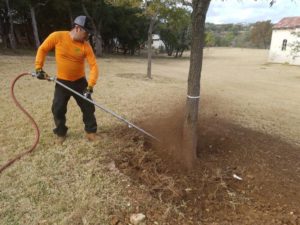 All trees are home to insects and this is usually not a problem. They provide shelter and food while the insects help to protect the tree, although there are cases where too many insects start to cause more problems than they solve.
All trees are home to insects and this is usually not a problem. They provide shelter and food while the insects help to protect the tree, although there are cases where too many insects start to cause more problems than they solve.
Common insect problems impacting trees in Round Rock include:
- Eating too much leaves – if too many insects are present on tree leaves, they may cause the foliage to disappear much quicker. Trees may lose up to 15% of their canopy from an insect infestation!
- Wood burrowing – a common issue for many trees, wood burrowing insects cause all kinds of damage inside of the tree. Signs of this include woodpecker markings, which show birds attempting to eat the beetle larva inside the wood.
- Root damage – while root systems are teeming with insects and microorganisms, too many may cause damage to the root system, resulting in poorer nutrient distribution and poorer growth.
How We Treat Insect Infestations
Most of these problems are easily treated with an appropriate insecticide. The biggest challenge is identifying the type of insect problem, which is where our expert arborists use their years of experience to quickly determine the cause of the issue.
Insecticides are usually applied with a soil drench or injection, with these methods being much safer than a spray. Some treatments may be suggested to encourage healthy recovery too.
Soil Compaction
Soil compaction affects many trees in Round Rock, and most people are not even aware there is an issue. This is because the soil is hidden below ground so it is not always obvious when there are issues from soil compaction.
It is important to treat soil compaction quickly otherwise your tree may suffer from the following problems:
- Poor root development
- Lack of soil aeration
- Lack of nutrients and moisture
- Stunted growth
- Possible death if left untreated for too long
So, it is important to act fast and treat the soil as needed, which is where our expert tree surgeons can help!
The first step to treating soil compaction is aerating the soil through a process called vertical mulching. This involves digging multiple narrow holes into the soil using a special auger, allowing air, nutrients, and moisture to better pass throw the root system, encouraging stronger and wider roots to growth.
After this, we work around the base of the tree, creating a special mulched and bordered bed around the base of the tree, helping to avoid future compaction. You may require small fencing around this section if the tree is in a public area like a park or playground.



